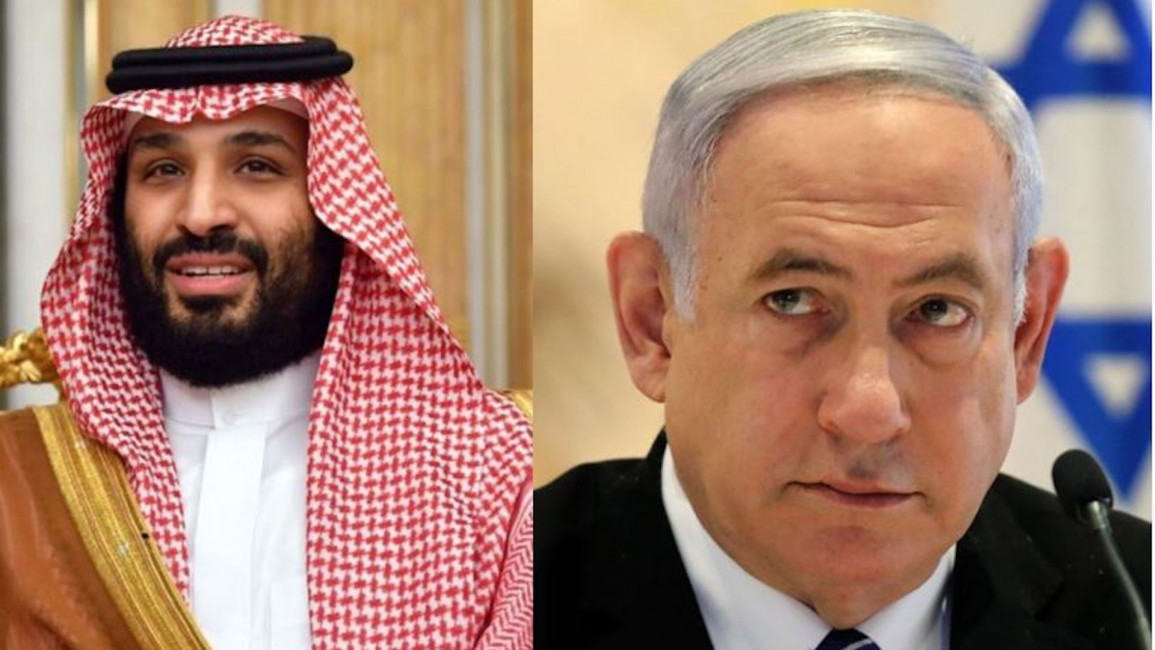
A Saudi-Israeli rapprochement?
A member of Netanyahu's cabinet confirmed the meeting, dubbing it an "amazing achievement," while Saudi Foreign Minister Faisal bin Farhan al-Saudi denied reports of the meeting over Twitter.
Haaretz reported that aviation tracking data showed that a private jet, reportedly the same one previously used by Netanyahu to visit Russian President Vladimir Putin, had made a trip from Tel Aviv to NEOM, where MbS and Pompeo had scheduled a meeting for the same day.
So what is to be made of the visit, and of Jared Kushner's more recent visit to Saudi Arabia? Is the Custodian of the Two Holy Mosques moving toward normalisation, and, if so, why the secrecy?
While Saudi Arabia has notably not followed the footsteps of neighbouring Bahrain or the UAE in normalising ties with Israel, as a reliable ally of the Trump administration, it has widely been speculated as likely to be the next to do so. Indeed, Saudi Arabia agreed on Monday to allow Israeli airliners to fly over their territory, for instance, to Dubai post-normalisation and to other destinations in Asia. With full normalisation seemingly off the cards, this could be the extent of things, at least for now.
Leaks on Wednesday also indicated that the White House is trying to start a GCC rapprochement by urging Saudi Arabia to allow Qatar use of its airspace. The Saudi foreign minister also stated last week that his country has "supported normalisation with Israel for a long time, but one very important thing must happen first: a permanent and full peace deal between Israelis and Palestinians."
 |
A member of Netanyahu's cabinet confirmed the meeting, dubbing it an "amazing achievement" |  |
Secretary of State Pompeo is said to be leading the charge on these efforts, in the hope of facilitating Saudi normalisation of ties before Trump leaves office in January. It is unclear, though, how Palestinian interests are being included in discussions of normalisation, and the Palestinian Authority and Fatah have refused to comment on the news of Netanyahu's visit to NEOM, largely because it remains uncertain whether Saudi Arabia - unlike others - will remain steadfast in its demands for Israeli Palestinian peace, in which the Trump administration seems largely disinterested.
In addition to Pompeo's tour of the Gulf and Netanyahu's visit to Saudi Arabia, Jared Kushner has travelled to the Gulf, leading to speculation that his trip is part of a last-ditch effort to spur reconciliation in the over three-year-old blockade of Qatar by Saudi Arabia, Bahrain, the UAE and Egypt.
Twitter Post
|
Kushner arrived in Saudi Arabia on Monday with a team that is said to include Middle East envoys Avi Berkowitz and Brian Hook, who have primarily been working on Israeli normalisation, rather than including a team of those who have worked on resolving the Gulf crisis. After his visit to Saudi Arabia, Kushner is set to travel to Qatar, perhaps signalling his intention to facilitate a Saudi-Qatari rapprochement, and rumours swirled on Wednesday from Kuwait - which has mediated the conflict from its start - about a forthcoming announcement about the GCC rift.
Read more: Will Kuwait's new emir continue to play role of Gulf mediator?
Notably, some progress was made this time last year between the Saudis and Qataris in reaching a resolution to the dispute, but ultimately failed to find a resolution. With a Biden administration set to come to office next month with less patience for Saudi adventurism than Trump and Kushner, the Saudis are likely more incentivised to make an arrangement with Qatar, even if it may be limited in scope and potentially in time frame.
The Saudis want to demonstrate to the incoming administration their continued utility to the US as a partner, and making moves toward normalisation with Israel and to ending the rift with Qatar, both of which would likely be welcomed by both administrations in Washington, would accomplish this aim.
As Natan Sachs and Tamara Cofman Wittes point out, however, even if a deal is reached, a major trust deficit remains between the US and Saudi Arabia, due to "brazen Saudi breaches of international and diplomatic norms, egregious abuses of human rights, and manifest disrespect for its longstanding partnership with the United States." These issues are likely not being discussed in Riyadh during Kushner's visit, yet will remain central to how the US government views Saudi Arabia moving forward.
 |
One final deal - even partial - between the Trump administration and Saudi Arabia would still take place in the framework of a transactional US-Saudi relationship |  |
One final deal - even partial - between the Trump administration and Saudi Arabia, whether linked to normalisation or to ending the GCC crisis, would still take place in the framework of a transactional US-Saudi relationship, and would continue to preserve both Trump's and Kushner's ties with Gulf leaderships and business communities out of office, since both retain business interests in the region and certainly stand to gain from Gulf investment at home.
The entire Gulf, under Trump, has become increasingly important to advancing his policy of maximum pressure toward Iran, even bringing Israel into the fold to complete Iran's alienation. One more deal could facilitate ties between the Gulf and Israel or between the states of the Arabian side of the Gulf more broadly, but is hardly sufficient to address the Biden administration's concerns about Saudi Arabia as long-term partner more broadly.
Dr Courtney Freer is a research fellow at LSE Middle East Centre.
Follow her on Twitter: @CourtneyFreer
Have questions or comments? Email us at: editorial-english@alaraby.co.uk
Opinions expressed in this article remain those of the author and do not necessarily represent those of The New Arab, its editorial board or staff.



